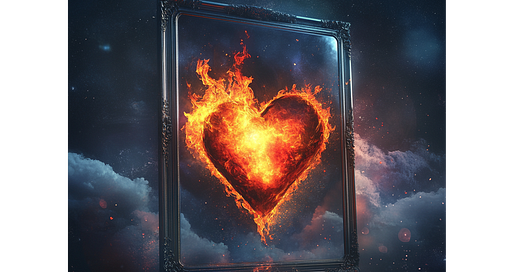When Leonard Cohen worked on new songs, he “fooled around” with his guitar until he felt like crying. Once he felt a “little catch” in his throat, he knew he had “made contact” with something deeper.
Until a few years ago, this would have sounded completely alien to me. Make yourself cry? Like, on purpose? As a guy? I’m sorry, what?
I used to hate it when a movie, song, or moment caught my heart. I preferred pushing emotions away to expressing them (let alone talking about them). Tears felt particularly icky. They seemed weak and embarrassing. There’s a German term for getting teary-eyed quickly: nahe am Wasser gebaut — to be built close to water. I did not want the house of my life anywhere near the volatile waters of emotion, no thank you. My house would stand on solid and dry rock.
My nightmare was to feel overwhelmed and lose control in public. Think of Roman Roy breaking down next to his father’s coffin during Succession’s funeral.
It’s a powerful scene because it captures our ambivalence. Roman shows us his heart. His reward? He is mocked. It is a career-ending moment. If tears have consequences, is it not rational to fear them?
Today, I feel very differently about tears, at least in private. In fact, I see them as a litmus test. Does what, or who, I face have the potential to move me to tears? And can I let myself be moved, or do I shy away from the intensity of the experience?
This change dates back to the years after my divorce. I realized that, well, it actually was a big deal, that I was spiraling into depression, and that I needed help. My default answer was to look for talk therapy.
For about a year, I left work once a week to sit in a bland office and stare at tired carpet flooring. Every week, I told a story. Something about my boss, my parents, dates, friends, money, whatever occupied my mind. Then I held my breath and waited for the dreaded question. “How does that make you feel?”

That drove me nuts. I was not feeling anything. If anything, my body felt kind of empty? Every week I went through the same excruciating and expensive experience. I wanted to be fixed without having to feel things. My therapist refused. When I returned to my thoughts, he gently prodded me back to my body.
Eventually, I did notice short and subtle flickers of feelings. They seemed to disappear as quickly as I caught them. Then I bumped into something new, something I had avoided for a long time: anger. Anger at my annoying therapist for starters. Turns out there was a lot more where that came from.
Today, my heart can catch quickly. My deepest experiences lead me to tears with remarkable consistency.
I journal to unlock emotions. Often I get angry first. Sometimes the page suffers. In rare cases, a pen breaks. But eventually, I cross the chasm to my heart.
Intense breathwork? I roar, weep, and laugh. Two hours of 5 Rhythms dance? I sweat, shake, and sob. Psychedelics? Tears and smiles, smiles and tears. Kambo frog poison? People around me purge and puke. I nearly pass out, then I wail. A beautiful church choir? Music? Great movie? Heck, even being dragged to Frozen the Musical can be enough…
This week, I traveled to Germany for my grandmother’s funeral. When Grandma was on her deathbed, and I was still in New York, I felt a flash of her presence during meditation. I knew it was time. And yet I felt nothing at first. When my father called, I was calm and collected. But I could tell that I was holding back. Over the following days, I created space to let the grief spill out.
It was different when my mother’s parents passed away. I was stoic and controlled from start to finish. I would be no Roman Roy. As a result, grief showed up many years later during moments of doing inner work. I think of it like an underground reservoir or a cavern filled with containers, an emotional debt accumulating since childhood. But I no longer want to be a carrier of ancient dark, cold water.
“As with Freud’s patients, I found that my patients’ physical symptoms were the direct result of strong feelings repressed in the unconscious,” Dr. John Sarno wrote about the connection between chronic ailments and emotions. For me, it wasn’t back pain but clenched jaws, depression, an inability to feel when I wanted to, avoidance of intimacy, stomach tension, and an unhealthy relationship with pornography.
Today, I try to catch myself when I get tense, distracted, or irritated. I pay attention when I slip into dissociation. I try to find out what is “working” inside me and release it. I know I feel more alive and conscious afterward.
The most dramatic change — this may sound completely trivial — has been that tears feel normal rather than dangerous. I am not worried about being overwhelmed or that a situation is “too much.” Letting things flow through my body reduces the pressure and teaches me about the experience itself. Whatever comes up, I can be more confident I won’t drown. I float.
Still, judgment can come up. A part of me felt disgusted when I began to write this post. What are you going on about? What do you experience that is so terrible? This is life! Toughen up. Be a man!
I am learning to reframe this and meet it with love.
First, noticing that life could be worse creates an opportunity to be grateful.
Second, if others have it worse, that is an opportunity to send love and be of service — to others and to myself.
Third, the more I witness feelings arise and disappear, the more I recognize them as “a happening” as Alan Watts would have said. They don’t need to meet a benchmark to be valid; neither should they be mindlessly followed or elevated.
Finally, we don’t know all that lurks in our shadows. The source of some anger and sadness may be impossible to understand — or not even be ours (remember the psychosphere).
“The mystery of life isn't a problem to solve, but a reality to experience,” as Frank Herbert put it in Dune. I am learning to move with the inner process, to let it unfold, and to leave it behind.
If I allow myself the grief, I get to experience the full memory of my grandmother’s loving presence. If I allow myself to listen to my heart, I also get to hear her voice. The reward for tears of grief, I’ve found, are tears of joy and gratitude.
— Frederik
In memory of Margarete Gieschen, 1933 — 2024.
👉If you would like to receive my work regularly, join 32,000+ other readers.
👉 If you enjoy reading this post, feel free to share it with friends or click the ❤️ button so more people can discover it on Substack 🙏
Journaling Prompt.
One of the simplest tools I’ve found is “Journalspeak” by Dr. Sarno and his student Nicole Sachs.
Write your way through: through grief and sadness, loneliness and failure, judgment and self-loathing. Write until you feel your heart catch. Keep writing until you notice your mechanisms of avoidance. Then keep going and pour it all out. Don’t write to dwell on it but to let it go. Write for yourself, to acknowledge what is, to admit the difficult truths of life — and to leave them on the page.
Nicole explains the method in the first episodes of her podcast and YouTube channel. It’s very simple.
I recommend you pick a new journal. Use a pen that allows you to write quickly.
Make a list of stressors (Sarno: “List all the pressures in your life, since they all contribute to your inner rage.”). Nicole recommends three lists: past stressors, current stressors, and personality tests.
Every day pick one and write for at least 20 minutes (especially in the beginning it can take time to transition from thinking to flow).
Sarno: “Write an essay, the longer the better, about each item on your list. This will force you to focus in depth on the emotional things of importance in your life.”
Sachs: “Tell the radical truth and don’t be afraid to go deep. Invite your feelings to rise. They won’t always do so right away, and that’s okay! True readiness is everything. Just stay the course and you will be surprised what comes out. The key is to stay focused on your emotional response.”
Sachs recommends “a self-soothing meditation for 10 minutes” afterward. I definitely need a break after an intense session. I swear by this Yoga Nidra channel (lie down, cover your eyes, listen, float…).
Challenge yourself to do this daily for 28 days.






Thank you for your thought. I am still sorry you lost your grandmother. But I am happy you seem to have had one you valued.
This was really nicely written! Like the 28 day challenge idea as well! 👏